If you just started keeping chicken in your backyard, you might need some ideas on chicken treats. Some of their favorite foods include fruits like cantaloupe, watermelon and pomegranates, worms, green leafy veggies, and various types of seeds.
Cantaloupe is safe for your flock of chickens and has essential nutrients. As a versatile food, both the rind, seeds, and flesh are edible. Just like any other treat, chicken keepers should offer cantaloupe in moderation to supplement the feed.
What makes cantaloupe suitable for your chickens’ diet? Let’s take a closer look.

Cantaloupe Nutrition Data
According to the U.S Department of Agriculture (USDA), the cantaloupe is nutritionally dense and contains essential vitamins and minerals. Compared to other high sugar fruits, they are low in carbohydrates, fat, and calories. Based on the USDA analysis, cantaloupes have the following nutrients.
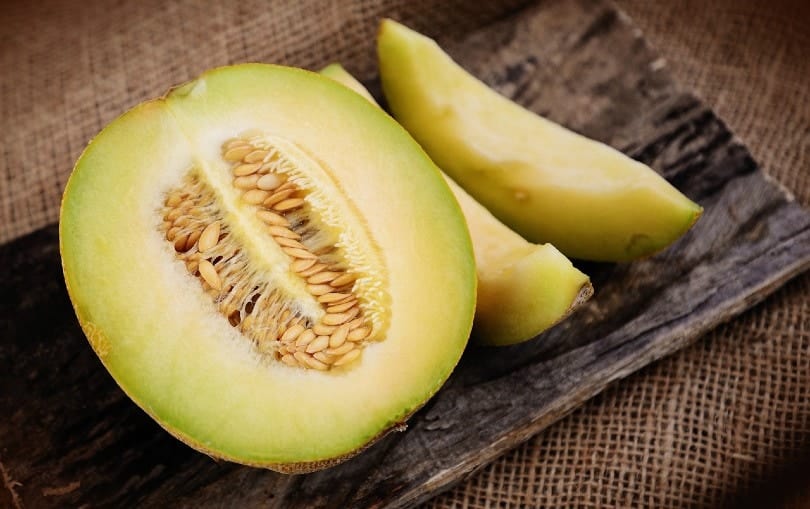
Vitamin A
Foods rich in vitamin A are good for vision, growth, and cell division. The nutrient composition of cantaloupe helps with your chicken’s digestive tract, respiratory, skin, and eyesight. Once your flock lacks vitamin A, they become predisposed to diseases such as conjunctivitis.
Vitamin C
Vitamin C is essential to your birds, especially for collagen synthesis. This nutrient contributes to healthy bone and tissue development in your chicken and cell maintenance and repair.
Under normal circumstances, chicken makes their vitamin C. However, this may not be enough during stressful conditions. Cantaloupe provides the external source of vitamin C to boost immunity and fight infections.
Beta Carotene
Chickens require beta carotene in determining the color of the skin, comb, eggs, feathers, skin, and beak. This nutrient is also an antioxidant that boosts the health of your chicken.
Calcium
In 100g of raw cantaloupe, the calcium content is 9g. Calcium is one of the essential nutrients for chicken. It helps with the development of strong bones in your flock. It’s crucial for chickens of all ages. For the young ones, they use calcium to grow.
Egg-laying breeds require calcium for the formation of solid eggshells. If you notice, your chicken eggs have weak shells; they have a calcium deficiency.
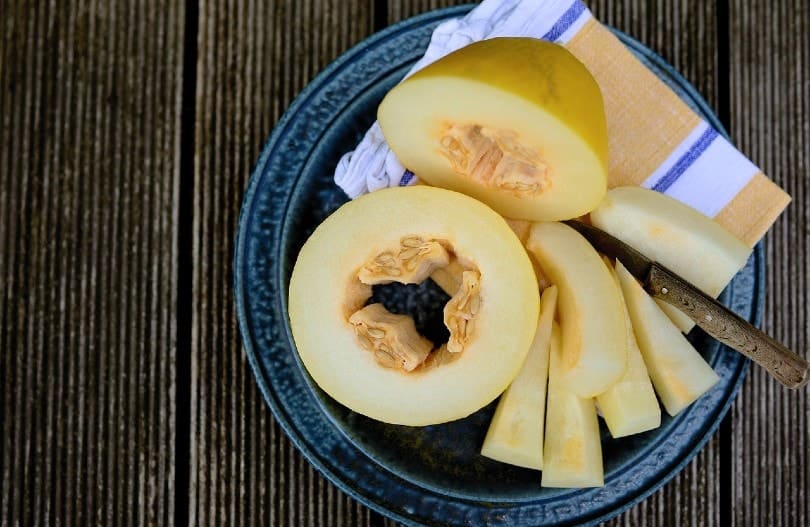
Potassium
The potassium levels in cantaloupe are relatively high. The benefits of this nutrient lie in taking care of the electrolyte balance in your flock. This balance helps in temperature regulation for your chicken.
An essential part of the body’s metabolic and cell functions, potassium contributes to the effective use of water in the chicken body.
Folate
Folate deficiency is common among chickens. The nutrient is difficult to find in the diet, yet it’s crucial for blood formation. The absence of folate makes your birds anemic and may experience stunted growth.
Folate also helps with body growth and the healthy formation of feathers. Therefore, supplementing the diet with cantaloupe provides a boost.
Antioxidants
Apart from beta carotene, cantaloupe also has antioxidants such as flavonoids and polyphenols. They are anti-inflammatory, which helps the body fight infections and repairs any damages. This nutrient builds the body tissue for your chicken, which translates to improved body and feather development.
Fiber
Cantaloupe is a source of fiber that is required for digestion. As a crucial nutrient, it promotes the development of a healthy digestive tract and eradicates constipation. This element makes cantaloupes most suitable for chicken in areas with a hot climate and temperatures.
Water
As a melon fruit, cantaloupes are high in water content. The flesh part is mainly made up of water which is essential for chicken hydration.

How to Feed Cantaloupes to Chicken
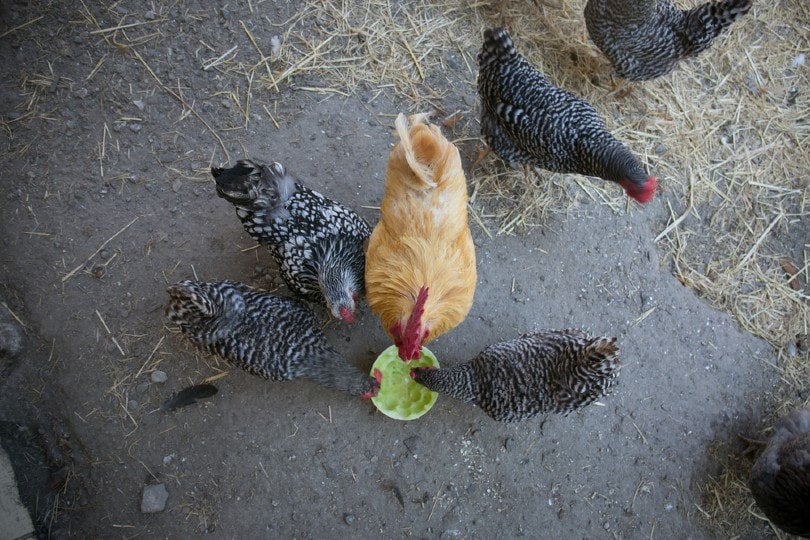
As a treat, cantaloupe should not make up the primary diet for your chicken. Chicken keepers should include this melon fruit on top of the main diet to boost nutrients.
Because chickens are not fussy eaters, they will tend to eat all parts of a cantaloupe. Each piece comes with different benefits for your flock. Let’s examine this.
The Flesh
As a fruit, the cantaloupe flesh is the juiciest part. It’s also the tastiest and contains a lot of water; hence the chicken will love it. This part is the easiest part for your birds. Because of the high water content, the flesh is perfect for hot weather conditions.
The Rind
The rind is the outer part (skin) of the fruit. It might not be very juicy and tasty, but it’s still very nutritious for your birds. The outer rind is fibrous. Chicken may not consume most of this part since it’s harder, but it’s very filling.
The Seeds
Cantaloupe seeds are safe for consumption by chicken. Due to the presence of a gizzard in their bodies, they can easily digest the grains.

How to Prepare the Cantaloupe
Just like any vegetables, you need to prepare them in advance. Doing this ensures that the cantaloupe is free from chemicals, pesticides, or herbicides that would harm your flock. You can also opt for purely organic vegetables, especially if you are going to include the rind.
There are several ways you can prepare the cantaloupe for consumption.
1. Wash the Cantaloupe
Washing your cantaloupe significantly reduces exposure to harmful chemicals. Scrub the melon thoroughly with clean water before feeding your chicken.
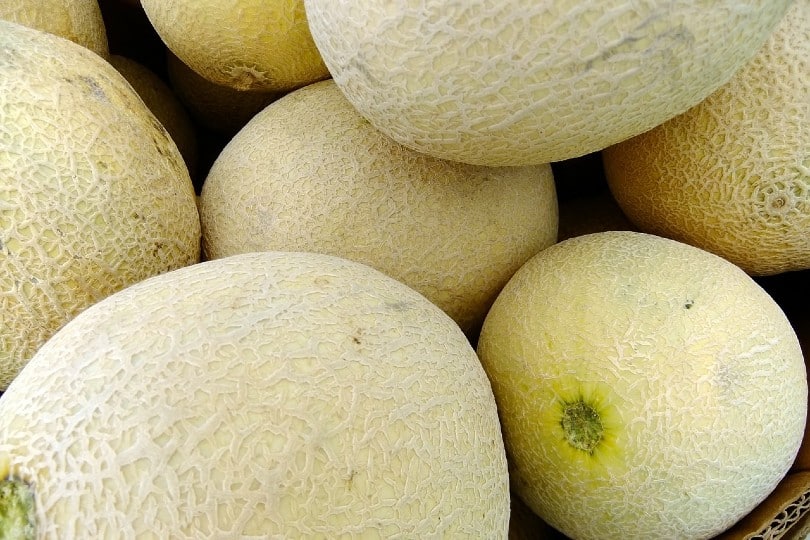
2. Cut the Cantaloupe into Pieces
Whether you have a few chickens or a flock, you can make feeding easier by cutting the melon into halves or quarters. Place these pieces in your coop for the chickens to peck at it.
Furthermore, you can choose to dice the cantaloupe and feed them chunk after chunk. This method effectively manages the portion sizes. Besides, you can also refrigerate the pieces and feed your chicken later either alone or with other feeds.
3. Prepare the Seeds and Rind
If your chicken flock enjoys the cantaloupe seeds more, you can dry them first to make them easier to consume. You can go a step further to grind them so you can mix them with other treats. When they are crushed, they can be combined with the pelleted feed to provide a nutrient boost.
As the least consumed part, the rind can also be dried and ground up to mix with other treats. This dash of taste in their regular feed will keep them looking forward to feeding time.
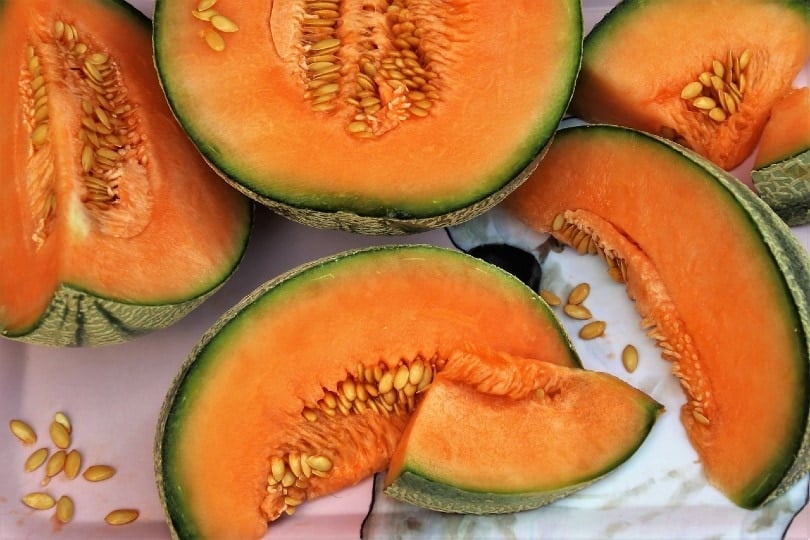

What Are the Risks of Feeding Cantaloupe to Your Chicken?
Cantaloupes are generally safe but can be risky in some circumstances. Let’s discuss some of them.
1. Stale Cantaloupe
Chicken peck at their food at intervals. For parts such as the rind, they might take a long time to finish. If you don’t remove the leftovers from the coop, the chances are that they will rot.
Feeding your chicken stale food could result in problems such as bacterial infections. It’s best always to throw away anything that has mold. Feeders should not store refrigerated pieces for more than two days to avoid bacterial infections.
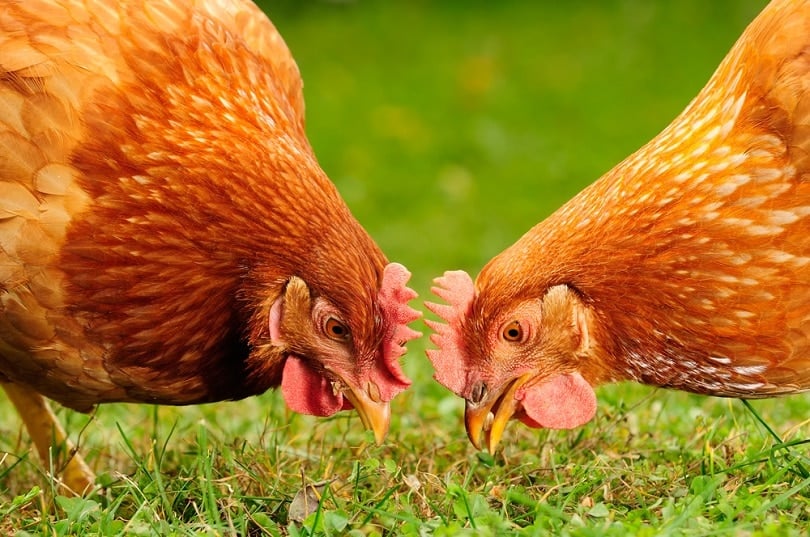
2. Unwanted Rodents
If you don’t remove the leftover food soon enough, this could easily attract unwanted rodents to your chicken coop. Having this presents more health risks and requires a proper strategy to eliminate them.
3. Overfeeding the Chicken
Cantaloupes are treats and not the main diet. Chicken requires feeds that provide most of the nutrients, with treats only acting as supplements. Therefore, you should be careful not to overfeed your flock with cantaloupes.
Too much consumption could result in problems. Treats should ideally make up 5% of the entire diet. If you need to get the appropriate amount, talk to your veterinarian. Therefore, as you plan your chicken meals, balance all the foods efficiently.
4. Cantaloupes with Chemicals
To avoid feeding your chicken, food, or treats that have harmful chemicals, it’s recommended that you clean them well. You can ensure the quality of treats by cleaning them to human consumption standards. Contaminated cantaloupes could easily infect your breed and even kill them.

Conclusion
Cantaloupes are a great addition to your chicken’s diet. Their high nutrient composition is beneficial for growth, bone formation, hydration, skin and feather development.
Despite these benefits, cantaloupes should not be relied upon as the main diet. They should be offered in moderation as a supplement. As much as chickens eat all the parts of the cantaloupe, you should maintain the freshness. Feeding them stale fruit could lead to bacterial infections.
Cantaloupes are safe for your birds as long as they are fresh. Therefore, as you prepare meals for your chickens, throw in some cantaloupe in the coop.
Chickens can eat cantaloupe, but can they eat celery or avocado? Our guides have more!
See Also:
